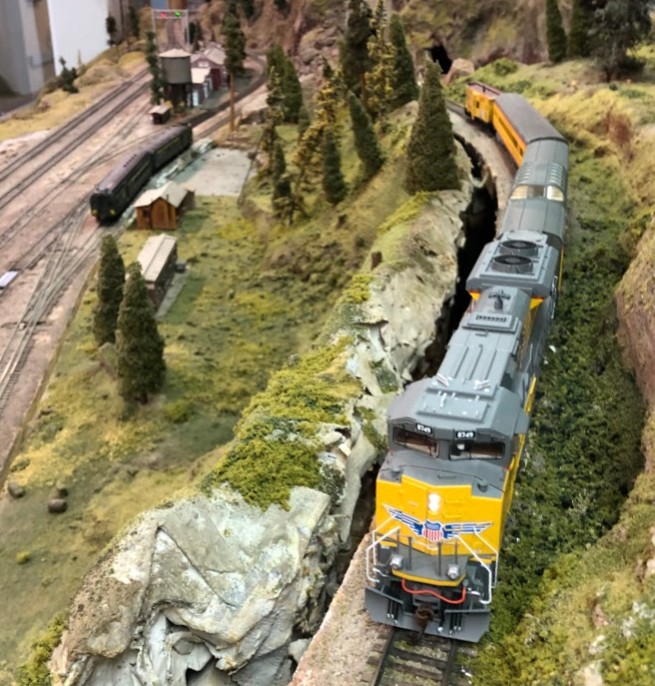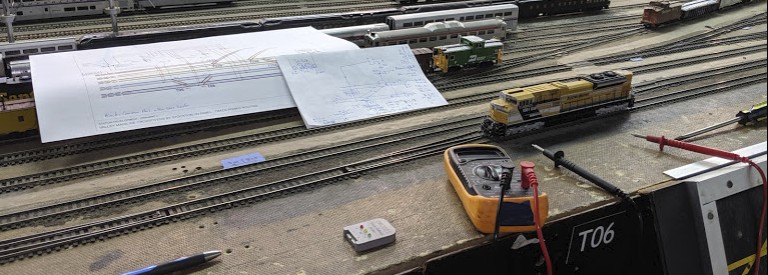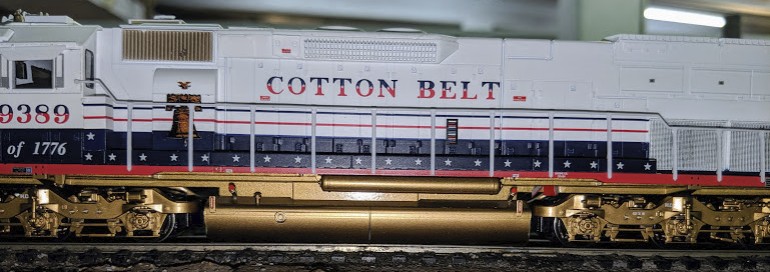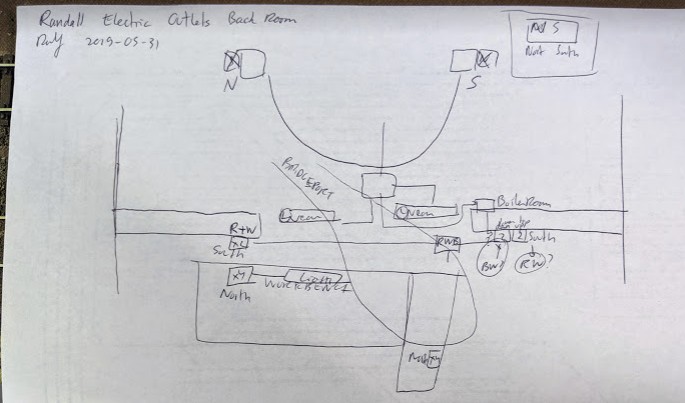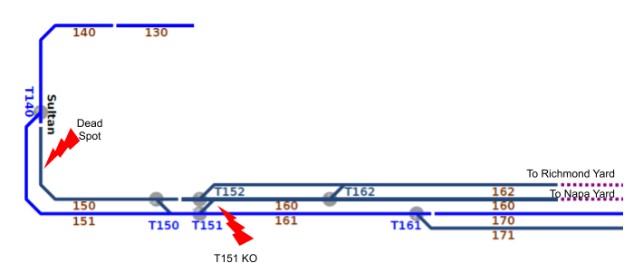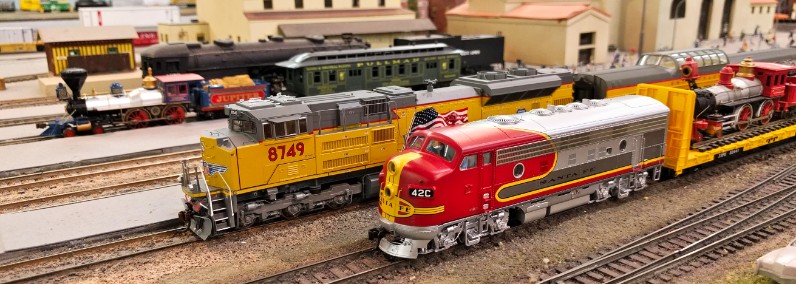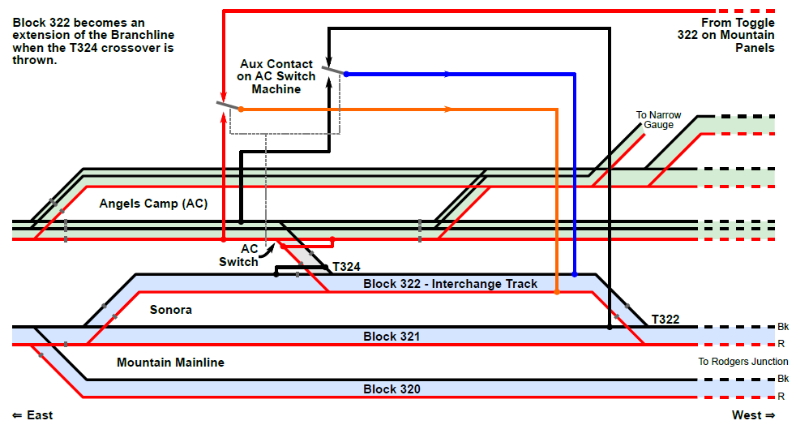The Randall Museum in San Francisco hosts a large HO-scale model model railroad. Created by the Golden Gate Model Railroad Club starting in 1961, the layout was donated to the Museum in 2015. Since then I have started automatizing trains running on the layout. I am also the model railroad maintainer. This blog describes various updates on the Randall project and I maintain a separate blog for all my electronics not directly related to Randall.
2019-08-06 - Track Cleaning
Category RandallHow do we clean the track on this layout?
Turns out it’s a bit of a complicated subject. Take any model train magazine or forum and you’ll get hundreds of different replies, everyone claiming to know better.
I, for one, don’t know any better. I only know what I’ve seen done, and what I tried, with either success or failure. Let’s do a list. Sit down, that’s going to be a long story.
Click here to continue reading...
Lately the automation has been partially stopped due to this:
The automated UP passenger train stops in the middle of the grade going up to Summit. No electrical power.
Click here to continue reading...
TEMPLATE TO BE EDITED
Affected |
Turnout T06 on mainline in front of Stockton Yard. |
Description |
Shorts mainline when thrown. |
Summary Fix |
Fixed itself, could not identify issue. Likely loose wiring or bad solder. |
Description of Issue
Recently turnout T06 had been out of commission. When throwing it, it would short the mainline. On the layout track plan, this turnout is part of a mainline cross-over in front of the Stockton Yard, which is fairly frequently used by the Saturday Operators -- they can build their train on mainline track #2 and then use that turnout to get it out on mainline track #1, for example.
Usually when I repair something, I made a protocol of documenting what was wrong and how it was fixed. My goal when doing so is to build documentation over time, as well as document changes to the layout. We really lack up-to-date documentation on the technical aspects of the layout besides the few schematics I got from Mr. Perry.
Click here to continue reading...
Today was another cleanup day. Mr. Morgan was here and helped me clean Napa quite a bit.
While he was doing this, I was trying to get this running for Jim, as detailed on my train blog page:
Click here to continue reading...
Jim got this engine for Randall in commemoration of the 150th Anniversary of the Transcontinental Railroad, and he ran it on the layout multiple times:
I had some issues with power pickup with this so I decided to toy a bit with it.
You can read the details on my train blog page.
The other day the back room had no power, while seemingly the rest of the layout had some. I don’t know if there are electrical schemas around -- I certainly don’t have any -- so I decided I’d document that and make a schema myself. Since I’m not an electrician, I need to look up how these folks draw their schemas first. In the meantime I compiled this:
Click here to continue reading...
Last week I spend most of the Sunday cleaning the Napa yard and its balloon track. The goal is to eventually be able to get a train out of the Napa yard and on the mainline. There’s still a number of challenges.
This Saturday, I did install a Frog Juicer Auto-reverser on the Napa balloon track. I simply put it in series with the reversing toggle, which means power can still be cut simply by using the “A power” 3-state toggle (yard, N, valley). Usage is thus simplified, one just needs to select the A or B push-buttons to align the entry turnout and the yard ladder.
I ran a train from Napa to Sultan to understand the various issues. I was running the TGV in MU with two opposite “head” units. That was sort of required as, although I spent a lot of time cleaning that track last week, it’s still kinda rough. It needs to see more usage before it gets smooth. A single engine will typically lose power at the most inconvenient places.
Let’s look at the track schematic on how to go from the yard to the mainline. The “normal forward” direction on the mainline (when operators run in a continuous loop) on this schema is from right to left:
Click here to continue reading...
2019-05-12 - Napa Yard Cleaning
Category RandallThis week I’ve changed from my regular “fix something that’s broken” schedule to deal with a long postponed task: cleaning the Napa yard so that it can be used. This yard has not been properly cleaned since 2015. I’ve somewhat asked others to take care of it and I didn’t get what I expected so I’m just doing it my way. I’m halfway done and to make the task more interesting I made a video:
Click here to continue reading...
An update on the automated mainline on the layout at Randall Museum, San Francisco: the UP passenger train now has two coach cars, and the freight train now has a Santa Fe F7A engine on the point. In the back of this picture one can see the special engine waiting May 10th to commemorate the 150th Anniversary of the completion of the American Transcontinental Railroad.
Previously the automated freight train was pulled by the NYC 4-6-4 Hudson. This engine has worked flawlessly and superbly. It will likely return after a well deserved break.
Video of both automated mainline trains in action:
Click here to continue reading...
I’ve just completed recreating one of Mr. Perry’s hand-drawn schemas, this time explaining the power routing for block B322, which is the interchange track between the Mainline and the Branchline near Sonora:
Let’s look at what’s going on.
Click here to continue reading...
